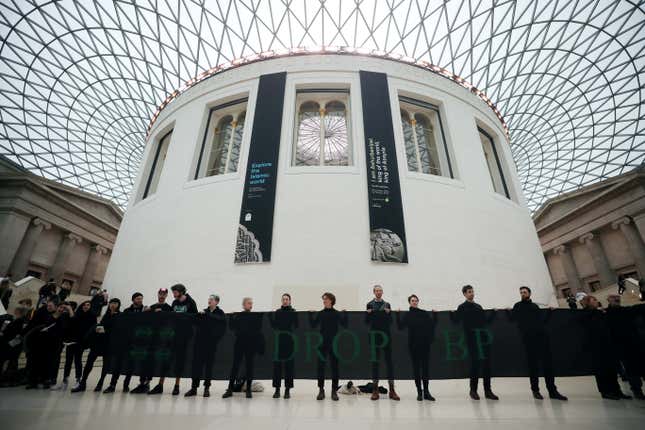If you visited a major British arts institution in the last 30 years, your trip was almost certainly subsidized by the corporation responsible for the third-largest contribution to climate change of any company in history.
BP, formerly short for British Petroleum, is an oil and gas giant and one of the largest companies in the world. In the UK, its philanthropic giving runs the gamut of high art: Royal Shakespeare Company, the National Portrait Gallery, the British Museum, the Royal Opera House, and many other cultural powerhouses.
But however lavish its donations, the company is equally profligate in its spending on lobbying to block unhelpful legislation on tar sands, power plants, or renewable energy initiatives. In 2011, BP and Shell together bullied the EU into scrapping its renewable energy and energy efficiency goals, in favor of a new target that allowed it to push natural gas, instead. (Natural gas is non-renewable and contributes to climate change.) More recently, it made a show of support for the EU’s push to get emissions to zero to 2050, but refused to support the target in official consultations.
You’d be forgiven for forgetting all this on the gallery floor, however. At the National Portrait Gallery, where the winners of the BP Portrait Award are currently on display, there is subtle BP branding throughout—the friendly green and yellow petals of the company’s 2008 logo redesign, representing “BP’s position as an environmental leader and its goal of moving beyond the petroleum sector,” according to the designer.
More and more, activists worldwide are pushing politicians and nonprofits such as the National Portrait Gallery to refuse donations from this sector. They say it’s a cynical PR strategy, and that these companies are hastening the arrival of the climate crisis and should therefore be ostracized. But here’s the problem: Those activists aren’t coming up with solutions for cash-poor institutions seeking support. (Surprisingly, they are only barely targeting the governments that give tax breaks to fossil fuel firms while cutting funding for the arts, if at all.) And their pressure is unlikely to change any aspect of the fossil fuel industry, beyond slashing its charitable contributions.

Most charities have hard and fast rules about which donations they can and can’t accept. The International Rescue Committee, for instance, does not accept donations from arms manufacturers. Others are less prescriptive: the European Center for Constitutional and Human Rights does not accept donations “from sources where to do so could foreseeably interfere with our independence or undermine our integrity.” Rules aside, few organizations today would today accept hand-outs from such controversial figures as Jeffrey Epstein or the Sackler family.
For David Miliband, who heads Rescue, the important question is whether the “horrible thing” behind the cash was actually against the law. “If it was illegal then it’s obviously not right to accept it,” he told Quartz. “Different charities will have different moral codes. And I think it’s important that those are transparent.” In an op-ed, Peter Singer, the philosopher and ethicist, suggested that organizations that have caused suffering should instead “use their billions not to promote the arts, but to reduce suffering, if possible on the same scale as the suffering brought about by the accumulation of their wealth.”
The oil, gas, and coal industries are a bit more complicated. For the most part, their companies aren’t breaking the law or helping people kill one another. Unlike tobacco or opioids, they’re a crucial part of the modern-day economy: how we power our lives and get from A to B. And, largely out of necessity, they’re leading the charge on sustainable fuels for the future. Of course, they’re also directly responsible for the impending climate crisis—and despite claims that they are taking it seriously, only 3% of the available capital is currently being invested in renewable energy.
For decades, companies such as BP have used high-profile philanthropy in part to make themselves look good—or, at least, less bad. For many such firms, it’s cheaper than getting out of whatever sin industry they’re in, and sometimes even rewards investors—some studies suggest that carefully managed “strategic philanthropy” can actually gently lift share price. “Exploitative labour practices or corporate malpractice are swept under the carpet as companies publicize tax-efficient contributions to good causes,” explain Carl Rhodes and Peter Bloom, in a Guardian long-read on so-called “philanthrocapitalism.” “Such contributions may be a relatively small price to pay compared with changing fundamental operational practices.”
Among the most visible opponents of BP’s donations is the actor Mark Rylance, who resigned from the Royal Shakespeare Company in mid-June, after 30 years with the troupe. “I do not wish to be associated with BP any more than I would with an arms dealer, a tobacco salesman or anyone who willfully destroys the lives of others alive and unborn. Nor, I believe, would William Shakespeare,” he wrote in an open letter. Seven years earlier, he had signed a petition accusing the sponsorship of “obscuring the destructive reality of BP’s activities.” His most recent actions come just a few months after hundreds of people occupied the British Museum in protest of its relationship with BP.
Given the opportunity, most charities wouldn’t choose to take donations from highly contentious industries, or be complicit in reputation management. (Many arts organizations have politics that skew decidedly green.) More pragmatically, it exposes them to unnecessary risk. As strategic risk consultant Victoria Bales notes, “the voluntary sector widely understands that a positive public image is vital to achieving charitable aims successfully and with integrity.” In practice, that means doing whatever nonprofits can to preserve a positive public perception. Being in the pockets of big oil, therefore, is less than ideal.
So why do they accept them? Often, it’s a simple question of trying to stay in the black. “We don’t have another option, other than to have a mixed set of funding,” Erica Whyman, the RSC’s deputy artistic director, said, speaking on a panel on climate crisis in 2017. “About 70% of our income comes from sources beyond our public funding, and that leaves us in a situation where we believe that corporate sponsorship has to be part of that picture.” While roughly 50% of the theatre’s income is made up of ticket sales, according to company filings, production costs exceed them by about £6 million. And while BP’s contribution isn’t publicly available, the £4 million brought in by corporate sponsorship and fundraising would be difficult to say no to.

In the UK, where corporate giving plays a much smaller role in the philanthropic landscape than in the US, a contribution as large as BP’s may be hard to find elsewhere. As of 2018, charitable giving from the largest 100 UK companies had fallen 11% since 2014. That’s despite a push from executives including BlackRock head Larry Fink for companies around the world to demonstrate “a positive contribution to society.” Without a precedent, or a significant push from the general public, there’s little incentive for companies to set the money aside—with the exception of those who hope to use it to benefit their own image.
Climate activists usually propose either moving to crowdfunding or partnering with an unspecified “more ethical partner.” But even very minimal crowdfunding targets of £10,000 have not been met, while at the moment it’s not clear which partner would make contributions at the same level as BP—as much as £10 million a year—while meeting ethical standards.
All this puts nonprofits in an extremely challenging position. If they accept the money, they’re utterly unscrupulous and perhaps even complicit in the wrongdoing involved. If they don’t, they must either push costs on to consumers or accept much more limited programming. So, what’s the solution? For activists, it might involve targeting BP to do better, or focusing efforts on the governments that simultaneously underfund artistic institutions while offering huge tax breaks to the companies who make up their shortfall. In the case of fossil fuel industries in the UK, tax subsidies may be as much as £6 billion a year—a break that oil and gas giants could certainly do without.

